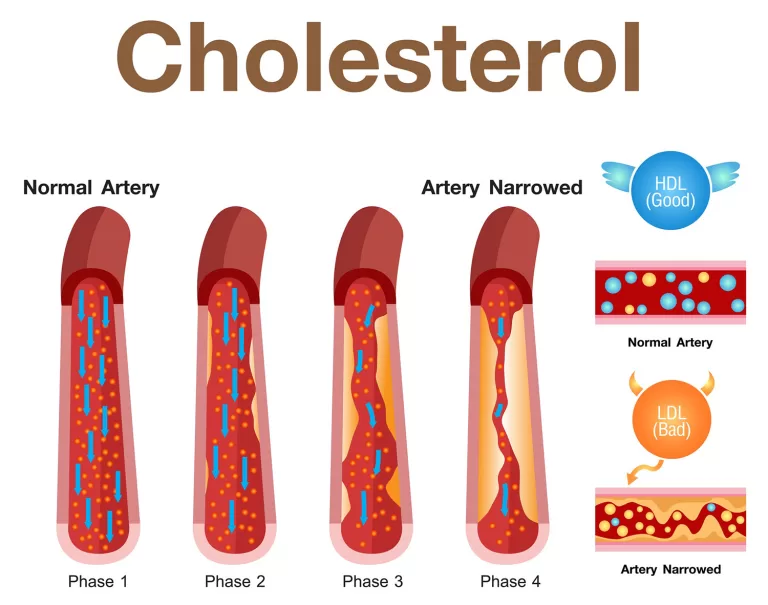Introduction
Cholesterol is a type of fat that’s naturally present in our bodies and some foods we eat. It might sound bad, but it’s actually essential for our health! Our bodies use cholesterol to build cells, produce hormones, and make vitamin D. Excessive cholesterol can cause health issues. In this article, we’ll learn how cholesterol levels affect your health and what you can do to maintain optimal cholesterol levels.
Understanding Cholesterol
Now, there are two main types of cholesterol: “good” HDL (high-density lipoprotein) and “bad” LDL (low-density lipoprotein).
1. LDL Cholesterol
Let’s talk about “LDL,” which stands for low-density lipoprotein. You can think of it as “bad” cholesterol. LDL can sometimes cause problems.
If you have too much LDL in your bloodstream, it can build up on the walls of your arteries.
These deposits form plaque, which narrows the arteries and makes it harder for blood to flow freely.
That’s why it’s important to keep your LDL levels under control and try to maintain a healthy balance between good and bad cholesterol in your body.
2. HDL Cholesterol
“HDL” stands for high-density lipoprotein, but you can also call it “good” cholesterol.
It’s like a friendly helper that travels in your bloodstream, collecting excess cholesterol from different parts of your body.
Then it brings that excess cholesterol back to the liver, where it’s processed and removed from your body.
So HDL is like a superhero that keeps your cholesterol levels in check and protects your heart!
3. Triglycerides
Triglycerides are another type of fat found in your body and in many of the foods you eat.
Elevated triglyceride levels, combined with high LDL cholesterol and low HDL cholesterol, can raise the risk of heart disease.
The Impact of High Cholesterol
High cholesterol levels can have a significant impact on your health, and not in a good way. Here’s how:
1. Cardiovascular Diseases
- The primary culprit behind many cardiovascular diseases is
- Atherosclerosis is a condition in which fatty deposits build up inside your arteries.
- This can limit blood flow to your organs, including your heart and brain. If a plaque ruptures or a blood clot forms and blocks a narrowed artery, it can lead to serious problems.
- Moreover, HDL and atherosclerosis are usually not noticeable until they lead to a serious event such as a heart attack or stroke. That’s why it’s often referred to as the silent killer.
2. Hypertension
- When high cholesterol and hypertension occur together, the risk of complications such as heart attacks and strokes increases.
- The combination of narrowed arteries and elevated blood pressure puts an enormous strain on the cardiovascular system, making it more susceptible to serious health problems.
3. Pancreatitis
- The impact of high cholesterol on pancreatitis is not a direct one, but there can be some connections between the two conditions.
- However, in some cases, high cholesterol can indirectly contribute to the development of pancreatitis, a condition where the pancreas becomes inflamed.
- Pancreatitis can cause severe abdominal pain and lead to other health complications.
4. Xanthomas
- High cholesterol may have a direct effect on the development of xanthomas.
- Xanthomas are small, yellowish fatty deposits that can form under the skin or around tendons.
- They are a type of skin disease and are typically associated with high cholesterol or other lipids in the blood.
Managing Cholesterol Levels
The good news is that you can take steps to manage your cholesterol levels and improve your overall health:
1. Healthy Eating
- Start by munching on a healthy diet rich in fruits, veggies, whole grains, and lean proteins.
- Ditch those unhealthy trans fats and limit saturated fats, which can raise cholesterol levels. Instead, opt for healthier fats like those found in nuts, avocados, and olive oil.
2. Regular Exercise
- Participating in regular physical activity can boost HDL cholesterol levels and enhance your heart health.
- Try to get in at least 150 minutes of moderate-intensity exercise every week.
3. Maintain a Healthy Weight
- Losing excess weight can positively impact your cholesterol levels and reduce the risk of heart disease.
4. Quit Smoking
- Smoking is a big no-no if you want to keep your cholesterol in check.
- Smoking reduces HDL cholesterol levels and harms blood vessels, raising the chances of heart disease.
- Quitting smoking can lead to significant improvements in cholesterol levels and overall health.
Conclusion
Cholesterol levels play a crucial role to maintaining good heart health and overall well-being. High cholesterol levels, especially LDL cholesterol, and triglycerides, can lead to various health problems, including cardiovascular diseases, hypertension, and pancreatitis. To keep your cholesterol levels in check, adopt a healthy lifestyle. Regular checkups with your healthcare provider will help monitor your cholesterol levels and assess your heart health. If necessary, your doctor may prescribe medications to complement lifestyle changes.
FAQs
What are the 5 signs of high cholesterol?
1. Chest pain or angina
2. Yellowish deposits under the skin or around tendons.
3. Fatigue and weakness
4. High blood pressure
5. Shortness of breath or difficulty breathing
Does garlic lower cholesterol?
Yes, garlic may help lower cholesterol. Studies suggest that garlic can have a modest impact on reducing LDL (bad) cholesterol and total cholesterol levels.
Can children have high cholesterol levels?
Yes, children can have high cholesterol levels, especially if they have a family history of elevated cholesterol or an unhealthy lifestyle.
Which drink removes cholesterol?
Green tea, Black tea, Herbal tea, Fruit juices, and smoothies can be part of a heart-healthy diet that may help manage cholesterol levels
Are all fats bad for cholesterol levels?
No, not all fats are bad. Healthy fats found in avocados, nuts, and olive oil can actually improve HDL cholesterol levels and overall heart health.


cheap cialis online